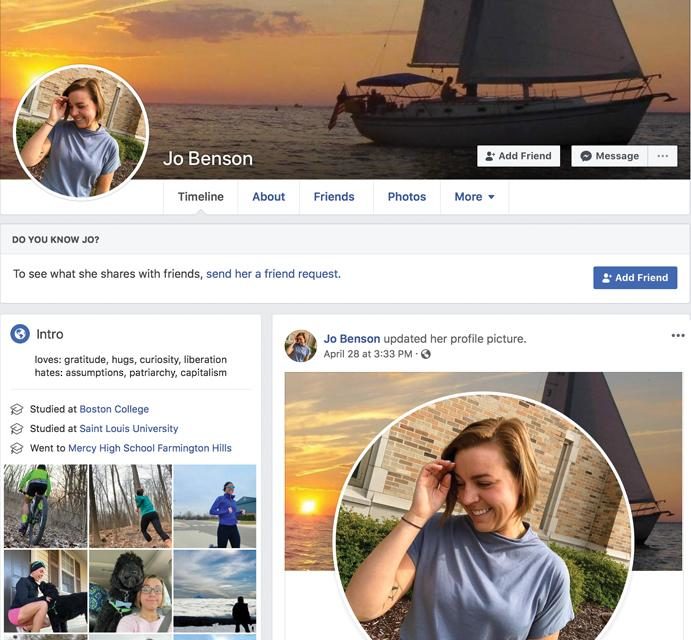“We count on our licensees to interact with the public with honesty and integrity,” wrote Orlene Hawks, director of the state Department of Licensing and Regulatory Affairs (LARA) in a press release. “When they don’t, we must move quickly to make sure that the public is protected from those who don’t follow the law.”
Benson’s license was suspended for “deceptive advertising”: she had promoted herself as a fully licensed therapist when she had only a “limited” license requiring her to work under supervision. But the action was hardly quick–a former colleague first warned LARA about her in March. And Hawks did not explain why Benson was granted a license in Michigan just three months after surrendering her license in Oregon–for the same offense.
In Oregon, she was known as Emily Clark–and as a serial cheater in marathon races ( “The Reinvention of a Therapist,” June 2020). The name change doesn’t explain how she slipped past Michigan regulators, though, because she applied as Clark and only later told the board she’d changed it.
The new name did mask her checkered history from prospective clients. As Benson, she promoted herself online as a private practice therapist in Ann Arbor, working with abuse and trauma survivors and women who’d been shamed for body size.
The ease with which she escaped her disgrace in Oregon dismayed Wayne Scott, who supervised her there until discovering her deceptions about credentials. In May, he told the Observer that to get a full Michigan license “she would have had to have submitted paperwork signed by me (which she couldn’t possibly have gotten).”
Benson apparently bypassed that obstacle by applying for yet another limited license–and once again flouting its requirements. Benson did try at least once to get a supervisor–but that suburban Detroit therapist, who asked not to be identified, told the Observer that Benson led her to believe “that this supervision was for additional hours required due to issues with the license transfer and that she was already a fully-licensed clinician in Portland.” After reading our story, she ended the arrangement.
“I feel very shocked that this was so well hidden,” said the therapist. “I value transparency working with clients and survivors and hope this level of secrecy is, one day, not an option in our licensing system.”
In comments on the online version of the article, social workers and former clients expressed alarm that she was still allowed to practice. One client said the therapist had told her a sexual assault she’d experienced was her fault because she was overweight. But even as Scott and another former boss in Oregon, Andrew White, repeatedly complained to LARA, the department’s online database gave no warning of any problems. White says he was told that “her license shows as clean since there were no ‘formal complaints’ against her … I wrote back asking why the four complaints I filed were not ‘formal complaints.'”
White ended up doing some of the board’s investigative work for them. In July, he sent the Michigan board Clark’s Oregon license surrender paperwork. “The investigator I talked to said they had never seen it (even though I had sent it to the board months before),” he emailed.
Despite the suspension, as the Observer went to press Benson continued to promote “shame, anxiety & body liberation for all” on her Instagram account, all.your.truth. On the account, which claims 1,363 followers, she endorses “117% Health at Every Size” (HAES) and calls for a stop to “diet culture or victim blaming BS.”
In an Instagram video, she says she loves being a therapist and will continue her practice while taking graduate public health courses at U-M because its program is HAES-friendly. The university registrar’s office confirms that she’s enrolled there.
Oregon’s regulators took even longer than Michigan’s to act: White first complained about Clark more than three years before she surrendered her license to end an investigation there. He believes the states’ slow response is “indicative of how we don’t treat mental health as seriously as physical health.”
Though state licensing boards are charged with protecting the public, they “allowed this to go on for quite some time, even with direct evidence of misdeed,” he says. “I don’t really understand how they allowed that to happen.”



I am so relieved to see that this woman has been barred from practicing. She is not ethical. She is unscrupulous and willing to stoop to any low in order to avoid her lies being discovered. She has gone to lengths not even documented in this article. She has taken money from clients without a license. She has caused harm to clients. She has caused harm to the profession. She went so far as to try to keep a woman who knew of her lies from receiving treatment for her own eating disorder so that “Jo” would not be found by the clients and employees of the faculty foe the fraud she is. She still claims to be a therapist to anyone that does not know if her lies. She will never stop unless she is barred from practicing anywhere and even that may not be enough.
And she continues to try and trick people by officially changing her name. How many people will she hurt once she is someone “new”? This is pathological and she is dangerous. Not sure how claiming defamation works in her case when all reports have been true.
https://www.gofundme.com/f/help-my-name-change-become-legal
At it again …
https://www.marathoninvestigation.com/2022/02/new-identity-same-results.html
Emily Clark, Jo Benson, Jo Bartlett, and now “JJ”, is claiming to have stage IV heart cancer. Not only that, she claims her dog is seriously ill too. She’s had a friend start the GoFundMe for her.
https://www.gofundme.com/f/xzuhk4-service-dog-in-need
https://www.gofundme.com/f/help-jj-stay-alive
She’s at it AGAIN!: https://www.gofundme.com/f/medical-and-living-expenses-for-jo